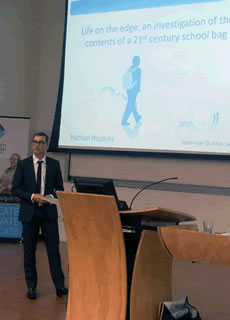BYOD study wins IITP research prize
The Institute of IT Professionals' annual student research contest was won by Nathan Hopkins from the School of Information Management, with a study on school students’ use of "bring-your-own" digital devices.
BYOD study wins IITP research prize
The Institute of IT Professionals' annual student research contest was won by Nathan Hopkins from the School of Information Management, with a study on school students’ use of "bring-your-own" digital devices.

Winner of the annual student research contest organised by the Institute of IT Professionals was Nathan Hopkins from the School of Information Management, with a study on school students' use of "bring-your-own" digital devices.
The contest showcases the final-year work of top honours students from Wellington's tertiary sector in ICT-related fields. Hopkins' work was up against presentations on the use of consultants in ICT development, student preferences for digital or hard-copy study notes and ways of "genetically" developing better algorithms for visual recognition of objects.
The contest coincided with plans to institute student chapters of IITP nationwide, aiming at better engagement of the Institute with academia and industry, thus improving the training of future ICT professionals and encouraging relevant research. As an incentive to growth of such chapters, the IITP student membership fee has been set at an affordable $10.
Hopkins says his research is relevant to the Ministry of Education’s vision for integrated learning -- that students should be "confident, connected, actively involved and lifelong learners", and that technology is an important "conduit" to this objective.
His aim was to investigate the ways BYOD technology is being used and to offer some pragmatic recommendations to schools, the ministry and other stakeholders to improve the productive use of the technology.
BYOD being comparatively new, there is comparatively little research on its use in schools, Hopkins says.
"I wanted to establish not only what devices students are bringing to school, but what factors are affecting the use of those devices."
The study was conducted through a written survey, completed by 386 students. Positive outlook of teachers and peers to BYOD, the student's own positive attitude and sense of control over the technology -- implying adequate training in how to use it -- were judged particularly influential in success.
Second-placed was Samuel Hindmarsh, with a complex presentation on automated visual perception of objects and the idea that existing algorithms might be improved by mutation, crossing and selection of variants in a way analogous to evolution of successful living creatures. Hopkins won a cash prize of $300 and Hindmarsh $150.
The other competitors, Lana Traut and Aaron Young, were given $25 book vouchers as recognition of the good quality of all the presentations.
Source: Computerworld
Contact:
Phone:
Email:
